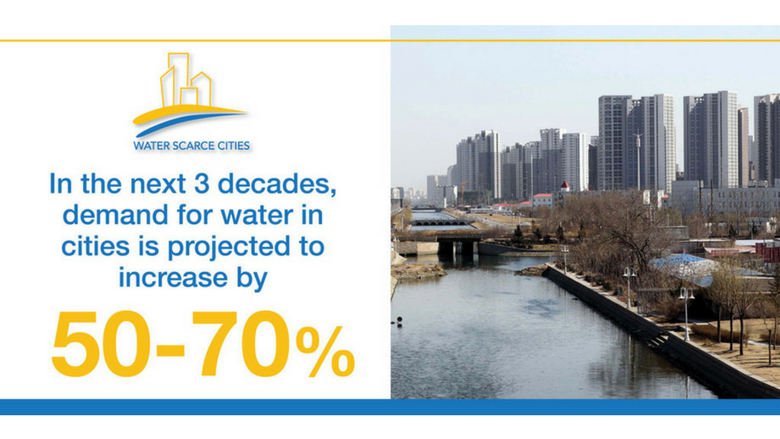Transforming Water-Scarce Cities into Water-Secure Cities
Published on by Water Network Research, Official research team of The Water Network in Government
The World Bank’s Water Scarce Cities (WSC) Initiative is an innovative undertaking that offers a holistic perspective to urban water security in scarcity conditions.

With a host of experiences and extensive global reach, WSC is working towards shifting mindsets across the world, demystifying urban water management, and engaging with water scarce cities to develop concrete solutions.
By serving as a connecting thread between water stressed cities, WSC offers a new avenue for knowledge sharing on water success stories and challenges to spark breakthroughs in best practices. WSC also offers an integrated water approach that encapsulates political, social, and institutional dimensions. The initiative is structured around the following key objectives:
Providing a toolbox and strategies for cities to support water resilience with knowledge products that highlight integrated water solutions.
Creating stronger connections between water scarce cities and sharing solutions by providing a platform for practitioners and experts, as well as global thought leaders and institutions.
Supporting water scarce cities with concrete engagement, including providing technical assistance for new water management approaches, technological advancements, and political practices.
From wastewater reuse to aquifer rehabilitation, below are some success stories that WSC is sharing among cities.
For example, Marrakech (Morocco) is rising above the challenge of urban water scarcity by diversifying its water resources portfolio, engaging in participatory groundwater management, and curbing its water demand by reducing leakages in its water networks.
In Orange County, California (USA), authorities have successfully reduced reliance on external water supplies by reusing wastewater, and using its aquifer as a safety net.
In Malta, a water-scarce island located in the Mediterranean, impressive efforts have been made to diversify water resources, including desalination of seawater and brackish groundwater and harvesting rainwater.
The City of Windhoek, Namibia is increasing water security through multiple approaches, including storing water for future use through careful aquifer management, and using direct reclamation of drinking water from domestic sewage effluent. In addition, Windhoek builds resilience against the stressors of a variable climate through regional water cooperation.
Read more: World Bank
Media
Taxonomy
- Policy
- Water Security
- Water Supply
- Integrated Urban Water Management
- Urban Water
- Water Supply
- Urban Resource Management
- Urban Water Supply
- Integrated Infrastructure
- Urban Water Infrastructure
- Integrated Water Resources Management (IWRM)